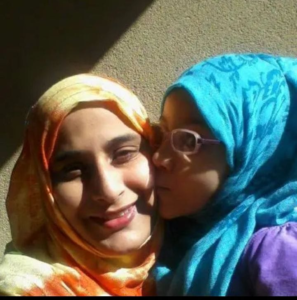This article was shared with permission from the account owner. The original article can be found here.
 The United States has grown to be a country which symbolizes diversity and freedom, but even with this connotation, many minority groups in the United States are subject to racism and prejudice. Indians and Muslims are both groups that have to go through this injustice, but can you imagine being both?
The United States has grown to be a country which symbolizes diversity and freedom, but even with this connotation, many minority groups in the United States are subject to racism and prejudice. Indians and Muslims are both groups that have to go through this injustice, but can you imagine being both?
The surge of hate crimes in 2020 against Asian Americans shows us that America isn’t always a friendly country. In fact, America has a history built on exclusion. There are roots for every minority or group who is excluded in the US. We can go back to the roots of Anti-Asian rhetoric with the Chinese Exclusion Act of 1882. We can also go back to the roots of discrimination against women, who were denied jobs and not taken seriously; leading to today’s women facing consequences with the gender wage gap.
The roots of hatred towards Muslims began centuries ago, intensifying with 9/11. Instead of addressing the attacks as a terrorist problem, public officials and news outlets turned it into a “Muslim” problem. These groups pushed the idea that all Muslims are terrorists and therefore dangerous, leading to a rise in anti-muslim hate crimes.
Many years have passed after 9/11, but anti-islamic rhetoric is still being spread throughout America. Today’s generation of Muslims have to deal with the consequences. Whenever a terrorist attack occurs, hate crimes against Muslims also go up, something truly terrifying to think about.
When I was nine, there was a terrorist attack in an Orlando nightclub. I remember coming to school the next day and my classmates staring at me like I did something wrong. I heard whispers about how I was Muslim, which made me a “terrorist”. They would say, “She’s going to bomb us, I hope the teacher searches her bag,” and would laugh shortly after. I was confused because I knew I could never do such a thing, and even if I could, why would they be laughing about it?
I went home later that day and started thinking deeply, to the point where my mom had to snap me out of it. She could tell something was wrong, I had been crying. My mom hugged me and asked me what was wrong. I told her that no one wants to be my friend because they think I’m a terrorist. Saying it out loud hurt me even more, I couldn’t believe people thought I could do such a thing. My mom tells me it’s a part of growing up in America, and that I’ll get stronger. But getting stronger is hard when people have more than one thing they can pick on you about.
I’m both Indian and Muslim so let me tell you, being Indian in the US isn’t a cakewalk either. Racism towards Indians is built into American culture, most people can’t tell when it’s wrong because it’s like casual comedy at this point. Indian accents are the #1 thing people like to make fun of, and barely anyone recognizes how problematic and wrong it is.
I remember in middle school, a group of boys frequently walked up to me and spoke in an “Indian accent,” to make fun of me. The whole class would joke about it. In fact, they were so unbothered about the racism I was facing that I started wondering if I had an emotional problem because of the way they made me feel.
The truth is, just because someone isn’t aware how hurtful something is, doesn’t mean the other person doesn’t have a right to be hurt– especially for insensitive, racist comments that are obviously meant to be offensive.
My mom immigrated to the United States before 9/11. When she told me her story, I could see her eyes tearing up. My mom has always tried to tell me to be strong, to not let the hatred get to me. “They aren’t worthy of your tears,” is something she told me throughout my childhood. To see her show weakness at that moment ached my heart.
My mom was 20 when she immigrated to the US. She came to the US for her future children. She wanted me, her daughter, to be independent and pursue my own career. These are the reasons she came to the US. But islamophobia and racism tried to turn a whole-hearted effort into something evil.
After 9/11 my mom started noticing the stares. These weren’t stares of curiosity, rather of rage and disgust. When my mom was pregnant with my older sibling, she remembered a women passing her by, looking at her belly, and saying, “that kid’s going to be a bomber.” The only thing she could do at that moment was gasp in shock, she couldn’t believe what the lady had just said about her unborn child. The worst part is she couldn’t reply to the comment because she knew if she did, she would be attacked, physically and mentally. All she cared about at that moment was the safety of her child.
After moving to the US my parents had a difficult time financially supporting themselves. My dad was desperate for a job. Because of this, racially motivated workplace discrimination is something my dad has experienced. His workplace was dominated by caucasians, leaving only a small percentage of minorities. These minorities were always under the fear of losing their job due to their race. My father was one of those people.
I remember he would always put in so much effort into work. One day he came back from work in a panic, he was going to be late for his shift at home. My dad is a software engineer so he can work from anywhere. In fear of losing his job, my dad would volunteer to take over some peoples shifts. My dad was terrified of losing his job because his only Indian co-worker lost his job at that time. He was as hardworking as the other workers, yet always got picked at due to his race. My dad told me that during meetings, his boss would randomly call out my dad and his co-worker and make a racist Indian joke. My dad’s coworker wouldn’t take it which ultimately led to him being fired.
My dad tried to stay as “American” and as compliant with the racism as possible due to the fear of losing his job. But
because of my fathers Muslim Indian identity, he had to keep up with the constant terrorist jokes and disgusted looks from co-workers. It’s a lie to say he wasn’t affected by it. Everyday my dad would dread going to work. He didn’t understand why he deserved any of it. But he had to keep up with it in order to financially support our family.
Hatred is something people tend to gravitate towards. Once people find a weakness, they want to attack. Why? Because they want power over you. This is something I kept in mind when I was being picked on because of my identity, something I can’t control. But, even if i could control being Indian or being born Muslim, why does it matter? Minority groups deserve respect regardless if you agree with their views or not.
Ethnocentrism, the inability to see other cultures from outside your own cultural view point. Yes, Caucasian Americans eat pork frequently and like to go to the club. In India that’s not normal because we have a different culture. What racists and islamophobes fail to see is that their race and religion isn’t the best and isn’t normal, because we all have different beliefs and cultural values. They’re entitled to theirs, and we are entitled to ours.
This article was shared with permission from the account owner. The original article can be found here.
 Sehar Sarang is a writer, founder, and activist. Her blog, Open Your Ears, focuses on bringing awareness and justice to solved and unsolved crime cases. She is also the Assistant Editor in Chief of SeaGlass Literary, a youth literature magazine focused on amplifying the voices of younger people. As a freelancer, Sehar specializes in writing about social issues related to women, people of color, and other marginalized communities. Outside of writing, she is the founder of two non-profit organizations, and is currently running a campaign to increase COVID-19 vaccinations in India’s impoverished communities.
Sehar Sarang is a writer, founder, and activist. Her blog, Open Your Ears, focuses on bringing awareness and justice to solved and unsolved crime cases. She is also the Assistant Editor in Chief of SeaGlass Literary, a youth literature magazine focused on amplifying the voices of younger people. As a freelancer, Sehar specializes in writing about social issues related to women, people of color, and other marginalized communities. Outside of writing, she is the founder of two non-profit organizations, and is currently running a campaign to increase COVID-19 vaccinations in India’s impoverished communities.

There are no comments
Add yours